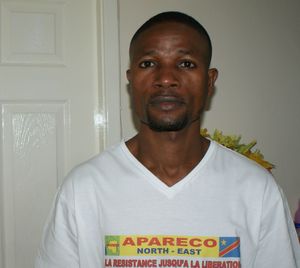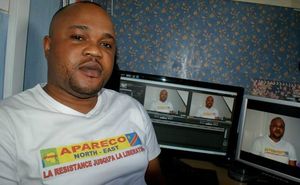magine being asked to move home at a moment's notice, without knowing where to. That's the reality facing hundreds of
asylum seeker families in Glasgow. By Jackie Kemp
 Akakpo Kangni-Soukpe is worried. "We do not want to go anywhere. We are enjoying Glasgow. Our neighbours have been so kind," he says. Now we have to leave again – our home and the people we love and who love us."
Akakpo Kangni-Soukpe is worried. "We do not want to go anywhere. We are enjoying Glasgow. Our neighbours have been so kind," he says. Now we have to leave again – our home and the people we love and who love us."
Kangni-Soukpe is an asylum seeker from Togo. Since 2007 he has been living in Glasgow. But he has just received a letter from the UK Border Agency, part of the Home Office, saying that he and his family must be ready to leave the home they have known for three years at any time – taking only two bags and without knowing where they are going except that it will be "somewhere within the Scotland region". It has come as a huge shock.
The Kangni-Soukpes are not an isolated case. There are more than 600 other families housed by Glasgow city council who have been thrown into confusion by the Border Agency.
The local community is rallying round. Worried refugees, along with friends and supporters, attended a meeting at Stow College last week, where more than 100 asylum seekers study. They were urged to resist eviction. "If someone touches you, that is assault. If someone tries to take your belongings, that's theft," Phil Jones, a volunteer at asylum seeker support charity the Unity Centre, told them. "The letter is written to scare you and that's because the Home Office knows that if you refuse to move, they have a big problem."
By way of encouragement, he told them how a mass campaign in the city to resist the movement of hundreds of asylum seekers to what he described as "substandard housing" was halted four years ago when 20 families, with the support of dawn patrols and pickets, resisted removal until more than £4m was spent upgrading the facilities.
The crisis in Glasgow has been triggered by the Border Agency announcing two weeks ago that it has ended its contract with the council to house asylum seekers, leaving hundreds of families needing a new home.
Glasgow social services department says it was not informed in advance about the agency's plans.
"While the council acknowledges the right of the UKBA to terminate the contract for accommodation and support to asylum seekers, we condemn the insensitive and thoughtless approach which they have taken to the communication of their decision to the individuals and families concerned," said the leader of the council, Gordon Matheson, the SNP group leader James Dornan, the Lib-Dem leader Paul Coleshill, Green party co-convenor Danny Alderslowe and independent councillor Colin Deans in a joint statement.
"To now have families, some of whom have been settled in the city for years, threatened with eviction and relocation with minimal notice is unacceptable," they added.
[This update was added on 24 November 2010: This story failed to include comments on the Glasgow situation from the UK Border agency. The comments were provided by the agency on 17 November, when the story was in preparation, and should have been included under normal Guardian reporting practice.
[In the agency's version of events, expressed in the comments, a finger seems to be pointed at the Glasgow council when it comes to termination of the contract: "The UK Border Agency and Glasgow City Council held discussions over a period of months to review the asylum housing contract. Despite UK Border Agency offering an increase on what are, already, the highest accommodation charges in the UK outside London we were unable to reach an agreement. Glasgow City Council invited UK Border Agency to terminate the contract and contractually we were left with no other option but to do so," said the statement, issued in the name of Phil Taylor, Regional Director for the UK Border Agency in Scotland and Northern Ireland.
["We are very hopeful that the majority of the asylum seekers affected by this change of contract will remain in their current accommodation," the statement went on. "If a move to new accommodation is required we will aim to give at least 14 days notice, where possible, and the costs of the move will fall to the new accommodation provider and not to the asylum seekers themselves."
[The agency said that it aimed to go on working with the council during the transition, adding that "letters have been sent to all asylum seekers currently housed by Glasgow City Council, explaining what could happen if they are required to move accommodation and further communication is planned to keep asylum seekers advised of future developments."] [See footnote]
According to Jones, the decision was triggered largely by a fall in the numbers being sent to the city and the success of the local community in preventing deportations when claims for asylum have been refused by the Home Office. He argues that a long campaign of direct action and political protest has made it virtually impossible to remove failed asylum seekers from the city. "We have created a space in Glasgow where the Home Office is a bit less powerful than it is elsewhere in the UK."
More than 22,000 asylum seekers have been housed in Glasgow over the last decade as a result of Labour's "dispersal policy", which sought to house asylum seekers away from the south-east of England. Now Glasgow has the largest number of asylum seekers in the UK, with around 2,300 housed in the city – 54% by the council.
Statistics are not available by region but most of those 22,000 applications are likely to have been refused. Subsequently, some will have left voluntarily. But hundreds, if not thousands, of failed asylum seekers who have been sent to Glasgow over the last decade may still be living in the city as illegal immigrants. Nationally, there were more than 6,000 forced removals last year. Local charities in Glasgow estimate that perhaps one or two families a week are currently being detained at the Brand Street immigration reporting centre, with some of these being freed on appeal and others deported.
Now, as Britain takes fewer asylum seekers than it used to – it is now 13th in the list of EU members taking them – the number being sent to Glasgow has fallen by more than half.
The Border Agency has not confirmed what it intends to do with the 600 families in Glasgow but it is likely they will be transferred to voluntary or private sector providers. Many asylum seekers fear they will be shunted around and lose any stability in their lives.
"My friend [who has been housed by the private sector] has been moved nine time in two years. She always has to have her bags packed. They never tell her where she is going but usually it is a completely different part of the city where she doesn't know anyone," says Tende Ani, who has been in Glasgow since she fled Zimbabwe five years ago.
When asylum seekers are moved from local authority provision there is no obligation to house them in the same district or even the same city, except in very rare cases. They have no control over where they are sent. Equally, councils cannot control where they are housed if it is in private accommodation. So the asylum seekers in Glasgow could end up housed in other cities in Scotland or elsewhere in the city.
Danny Alderslowe, Green party councillor for the city's Southside Central ward, says: "There are huge implications of this, for the council and for the asylum seekers. My main concern is that private companies provide a very poor standard of housing. It is all done in the cheapest way possible. They also regularly transfer people from one side of the city to another at short notice. They make life really stressful for people who are already stressed."
Jamie O'Neill of Positive Housing in Action, another charity supporting asylum seekers in the city, says: "We know of many cases of people being transferred several times in a year, including families with children. It does make it harder for people to integrate into their communities."
The situation in Glasgow seems to be symptomatic of a growing trend towards outsourcing housing for asylum seekers.
Last month, Birmingham council terminated its contract with the Border Agency. A spokesperson for the council said the housing was required for local families but that it would take back the accommodation gradually as the asylum seekers left.
In Glasgow, many former asylum seekers who now have leave to remain have put down roots in the city. "Life is hard in Glasgow," says Albert Mbaki, a former asylum seeker, who has opened an African hairdresser-cum-deli in the city. The Mbakis are clinging on by their fingertips, in a street where few businesses appear to thrive. "We want to work but it is hard to find a job," says Mbaki, once a maths teacher in the Democratic Republic of Congo. "And the climate is not easy either. But the people of Glasgow are very approachable. We do feel welcome."
But for more than 600 families who found in Glasgow a place they could begin to call home, the future looks as troubled and uncertain as the bleak November sky above their adopted city.
Some names have been changed.
This article was amended on 22 November 2010. The original said that the UK Border Agency had declined to comment on this story. This has been deleted, as the agency had indeed commented, on 17 November, when it sent a statement that had been issued to media earlier in the week. The story has now been updated to include an edited version of the UKBA comments. A published correction will also appear in the Guardian's Corrections & clarifications column.
 29 Octobre 2010 une date pas comme les autres dans les annales de la communauté congolaise du Royaume-Uni. Une date de tous les dangers et de tous les enjeux. C’est surtout le jour où l’Alliance des Patriotes pour la Refondation du Congo a choisi pour faire écouter sa voix devant la face du monde au sujet de la mascarade d’élections que Hyppolite Kanambe alias Kabila Joseph et sa clique des alimentaires veulent encore une fois imposer au peuple Congolais.
29 Octobre 2010 une date pas comme les autres dans les annales de la communauté congolaise du Royaume-Uni. Une date de tous les dangers et de tous les enjeux. C’est surtout le jour où l’Alliance des Patriotes pour la Refondation du Congo a choisi pour faire écouter sa voix devant la face du monde au sujet de la mascarade d’élections que Hyppolite Kanambe alias Kabila Joseph et sa clique des alimentaires veulent encore une fois imposer au peuple Congolais.
/https%3A%2F%2Fprofilepics.canalblog.com%2Fprofilepics%2F2%2F6%2F265899.jpg)









